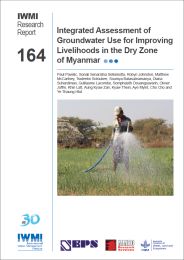 In the Dry Zone of Myanmar, improved access to water is widely acknowledged as being vital for livelihood enhancement and the general well-being of around 10 million people, most of whom depend on agriculture. Thus, expanding the sustainable use of groundwater is of great importance for socioeconomic development. According to this study, opportunities for accessing groundwater are generally good, and development of the resource has steadily increased over the years. However, there still appears to be good prospects for expanding groundwater use for irrigation, with a view to increasing agricultural production. Provision of affordable mechanical technologies for drilling wells and support with credit facilities to purchase small-capacity motorized pumps for irrigation could improve food security and livelihoods, where there is potential to expand groundwater use. Replenishable groundwater resources of the Dry Zone are likely to be less than previously thought. Thus, it is important to find the right balance between increasing development of the resource for enhanced irrigation, while also protecting its existing beneficial use for communities and the environment.
In the Dry Zone of Myanmar, improved access to water is widely acknowledged as being vital for livelihood enhancement and the general well-being of around 10 million people, most of whom depend on agriculture. Thus, expanding the sustainable use of groundwater is of great importance for socioeconomic development. According to this study, opportunities for accessing groundwater are generally good, and development of the resource has steadily increased over the years. However, there still appears to be good prospects for expanding groundwater use for irrigation, with a view to increasing agricultural production. Provision of affordable mechanical technologies for drilling wells and support with credit facilities to purchase small-capacity motorized pumps for irrigation could improve food security and livelihoods, where there is potential to expand groundwater use. Replenishable groundwater resources of the Dry Zone are likely to be less than previously thought. Thus, it is important to find the right balance between increasing development of the resource for enhanced irrigation, while also protecting its existing beneficial use for communities and the environment.
Pavelic, Paul; Senaratna Sellamuttu, Sonali; Johnston, Robyn; McCartney, Matthew; Sotoukee, Touleelor; Balasubramanya, Soumya; Suhardiman, Diana; Lacombe, Guillaume; Douangsavanh, Somphasith; Joffre, O.; Latt, K.; Zan, A. K.; Thein, K.; Myint, A.; Cho, C.; Htut, Y. T. 2015. Integrated assessment of groundwater use for improving livelihoods in the dry zone of Myanmar. Colombo, Sri Lanka: International Water Management Institute (IWMI) 47p. (IWMI Research Report 164) [DOI] | Fulltext (3 MB)

